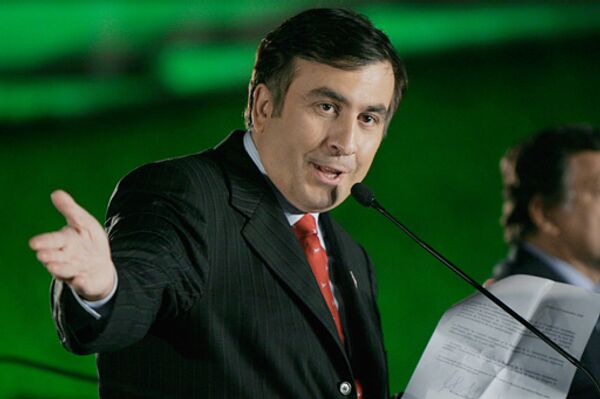TBILISI, July 13 (RIA Novosti) - Georgian President Mikheil Saakashvili called on Monday his Russian counterpart Dmitry Medvedev's visit to South Ossetia "immoral" and "despicable."
Medvedev arrived in South Ossetia earlier on Monday on his first visit to the tiny, former Georgian republic, recognized as independent by Russia last August after a five-day war that began when Georgia attempted to take the province back under central control.
At a meeting with his South Ossetian counterpart, Eduard Kokoity, Medvedev said Russia was ready to develop contacts with the republic and implement joint projects in various spheres.
Saakashvili said the visit was a response to Monday's Ankara summit on the Nabucco project, which he claimed "Russia regards as a failure of its diplomacy."
Five of the six parties to the Nabucco gas pipeline project signed on Monday an intergovernmental agreement on the transit of Caspian gas to Europe, bypassing Russia.
He also suggested that Medvedev's visit came in response to the July 6-8 visit to Moscow by U.S. President Barack Obama, during which Russia "realized that it could not carry out new aggression against Georgia."
Saakashvili said that Medvedev's visit to Tskhinvali "will go down in the history of Russian diplomacy as an immoral and shameful precedent."
"While the leader of little Georgia is out of the country, together with other world leaders making decisions on global issues, the Russian president furtively goes to one of Georgia's regions and personally participates in talks with a corrupt, criminal and inhuman regime," Saakashvili, who attended the Ankara summit, said.
So far, only Nicaragua has joined Russia in recognizing South Ossetia and Abkhazia, another former Georgian republic.
The Nabucco pipeline is seen as a rival to the Moscow-backed South Stream project designed to annually pump 31 billion cubic meters of Central Asian and Russian gas to the Balkans and on to other European countries.
Europe has expressed concern about its reliance on Russia, which meets a quarter of its gas needs. Calls for diversified supplies intensified following a bitter price dispute between Russia and Ukraine in early 2009, when Moscow cut off gas to Ukraine, affecting consumers across Europe.


